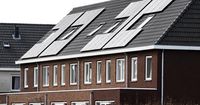In a significant shift for solar energy users in the Netherlands, the government has announced the abolition of the salderingsregeling, a net metering system that has allowed homeowners with solar panels to offset their energy consumption costs by returning excess electricity to the grid. Set to take effect on January 1, 2027, this decision has sparked outrage among solar panel owners, with nearly 145,000 individuals joining a mass claim to challenge the government's move.
The salderingsregeling has been a vital financial mechanism for solar energy users, enabling them to balance the energy they produce with what they consume. Many feel blindsided by the abrupt announcement of its termination, which they argue undermines the investments they've made in solar technology. According to the director of Holland Solar, Wijnand van Hooff, "We understand that the removal of the salderingsregeling raises questions for those who have invested in solar panels. However, the mass claim is not the solution. The scheme was always intended to end; it is now time to look ahead and help consumers use their self-generated power more wisely."
The mass claim, organized by lawyer Oscar van Oorschot, is aimed at either saving the salderingsregeling or securing compensation for affected homeowners. Van Oorschot argues that the government's communication about the phase-out was unclear, stating, "I hear Wijnand say that there was a lot of clarity, but that’s not true. No one knew this. The expectation was that it would be phased out over a period of eight to ten years, but now it’s within two years. That’s far too fast!" He emphasizes that many people feel misled, having been encouraged to adopt solar energy under the impression that they could benefit from the net metering system for a longer duration.
Holland Solar, representing the interests of the solar industry, asserts that the termination of the salderingsregeling was anticipated and aligns with broader trends seen in other European countries, including Germany and Belgium, where similar measures have already been scrapped. Van Hooff points out that the Netherlands is one of the last countries still allowing net metering, and maintaining such a system is not sustainable in the long run. He notes, "The structural saldering of solar power will not hold up over time; it puts unnecessary pressure on the electricity grid and does not sufficiently encourage consumers to use electricity at the right times."
As an alternative to the salderingsregeling, Holland Solar is advocating for a 'flexbonus', a proposed incentive that would reward households for using or storing the electricity they generate. Van Hooff elaborates, "A flexbonus is a bonus that people receive when they actually use the electricity they generate themselves." This could involve using a heat pump to warm water during sunny periods or charging electric vehicles when solar energy is abundant. Van Hooff believes this approach could also stimulate the adoption of home batteries, which are currently not widely used.
However, van Oorschot remains skeptical about the feasibility of such alternatives. He argues that many people cannot afford the upfront costs associated with electric vehicles or home battery systems, which can run upwards of €7,000. "I hear that people need to buy an electric car. Many individuals don’t have the money for that. Furthermore, you need to be home when the sun is shining to charge your car, but many people are at work during those hours. The batteries are still not good enough; you can only store energy for a few days. Who is going to invest €7,000 in a battery that doesn’t work well?"
The debate surrounding the salderingsregeling and its impending termination has reignited discussions about the future of solar energy in the Netherlands. With over three million households equipped with solar panels, the impact of this policy change is expected to be significant. As the government prepares to implement these changes, many solar energy advocates are calling for a more supportive framework that ensures the continued viability of solar power in the country.
In light of the current situation, Holland Solar urges the government to prioritize the implementation of the flexbonus by 2027, coinciding with the end of the salderingsregeling. Van Hooff insists that it is crucial to support consumers in transitioning to a new energy model that encourages self-consumption and reduces dependence on the grid. He states, "With a flexbonus, we can help people consume their energy themselves and lower their energy bills. This will make it attractive again for people to invest in solar energy and also prevent grid congestion."
The outcome of the mass claim remains uncertain, as the legal process unfolds. For now, the approximately 145,000 individuals who feel wronged by the government's decision are left grappling with the implications of this policy change. The discussion around solar energy, net metering, and sustainable practices continues to evolve, as stakeholders from various perspectives weigh in on the best path forward.
As this situation develops, it highlights the broader challenges facing the energy sector as it transitions towards more sustainable practices while balancing the needs and expectations of consumers. The government's next steps will be crucial in determining how solar energy remains a viable option for households in the Netherlands.






